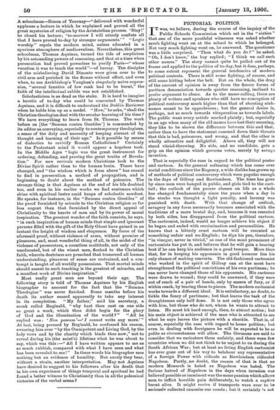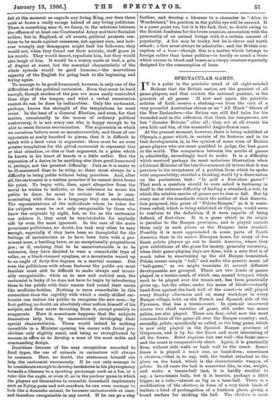PICTORIAL POLITICS.
T was, we, eleve, during the course of the inquiry of the I.
Public Schools Commission which sat in the " sixties " that one of the more youthful witnesses was asked whether much fighting went on at the school to which he belonged. Not very much fighting went on, he answered. The questioner was a little surprised. "Then what do you do " he asked. " Oh, I don't know," the boy replied ; " I think we call each other names." The story cannot quite be pulled: out of its frame and applied to the politics of to-day, but it does, perhaps, to some extent represent the general tendencies of modern political contests. There is still some fighting, of course, and still some hitting below the belt. But on the whole, the drag of the current of opinion is away from the fiercer forms of partisan denunciation towards quieter reasoning, inclined to prefer argument to abuse. As to the name-calling, there are plenty of writers and speakers who still have no conception of political controversy much higher than that of shouting nick- names meant to be opprobrious ; but the general desire is, perhaps, not so much towards vituperation as towards labels. The public want every article marked plainly ; but, especially in an age when many of the old names have lost their meaning, they like to be shown the difference between this and that, rather than to have the statement rammed down their throats that this is bad, poisonous, and wrong, and that the other is wholly attractive and delightful. Above all, they will not stand vitriol-throwing. No side, and no candidate, gets a grip on the opinion which governs votes, merely by savage invective.
That is especially the case in regard to the political poster and cartoon.. In the general softening• which has come. over social conditions since the Regency, a wide dislike has grown up of methods of political controversy which were popular enough in the days of Gillray and Rowlandson. The time has gone by since men were hanged in public, and girls tied to the cart- tail ; the outlook of the poorer classes on life as a whole has changed fundamentally since the years when a day in the stocks was thought a light penalty, and larceny was
punished with death. With that change of outlook, savagery in any form necessarily becomes associated with the traditions of a more brutal day, and, because it was resented by both sides, has disappeared from the political cartoon. The cartoonist, indeed, would no longer achieve his object if he began and ended with recrimination and personalities. He knows that a. bitterly cruel cartoon will be resented as something unfair and un-English ; be dips his pen,.theref ore, "in vinegar, never in vitriol," as one of the most prominent of cartoonists has put it, and believes that he will gain a hearing best if he can keep his audience in a good temper. More than that, for in keeping his opponents in. good humour lies his only chance of making converts. The old-fashioned cartoonist who worked in the spirit of Gillray can at the most have strengthened the political convictions of his own partisans; he can never have changed those of his opponents. His cartoons were drawn to wound; they could be answered, if they were out of reach of a pair of hands, only by sneers of fury, or if within reach, by tearing them to pieces. The modern cartoonist works towards a different ideal. It is satisfactory, no doubt, to tickle the fancy of partisans; but that leaves the task of the draughtsman only half done. It is not only those who agree with him, but those who do not, whom he wants to attract to listen. He must hit hard enough, then, to attract notice ; but his main object is achieved if the man who is attracted to see what he says leaves the picture with a chuckle. That is, of course, especially the case with regard to home politics ; but even in dealing with foreigners he will be expected to be as polite as circumstances will allow. The. Germans are said to consider that we caricature them unfairly, and there were few countries whom we did not think to be unjust to us during the South African War; but at least no living English cartoonist has ever gone out of his way to belabour any representative of a foreign Power with ridicule as Rowlandson ridiculed Napoleon. Partly, no doubt, the reason of that is that no modern Monarch is hated . as Napoleon was hated, The
furious hatred of Napoleon in the days when invasion was believed possible or imminent was the same passion which allows men to inflict horrible pain deliberately, to watch a captive burnt alive. It might revive if transports were ever to be seriously collected opposite our coasts ; but it certainly ;s not
felt at the moment as regards any living King, nor does there exist at home a really savage hatred of any living politician. There is something near it, we fancy, in the relations between the officers of at least one Continental Army and their Socialist critics ; but in England, at all events, political protests con- tinue to be made against measures, not against men, and how- ever wrongly any demagogue might lead his followers, they would not, when they found out their mistake, stuff grass in his mouth. They would desert, repudiate him, but they would also laugh at him. It would be a wintry smile at best, a grin of disgust at worst, but the essential characteristic of the whole episode would be good humour,—the marvellous capacity of the English for going back to the beginning and trying again.
To manage to be good-humoured, however, is only one of the difficulties of the political cartoonist. Even that must be hard enough, though strokes of the pen are more easily controlled than slips of the tongue, and what a verbal recantation cannot do can be done by indiarubber. Only the cartoonist, perhaps, knows the strength of the temptations he must resist. In the heat of a General Election, and even, for that matter, occasionally in the course of ordinary political controversy, it is not every one who is happy enough to be able to resist furious recrimination. The arguments in which we ourselves believe seem so incontrovertible, and those of our opponents so easily knocked to pieces, that it is difficult to speak with a level voice in argument : there must be an even greater temptation for the gifted cartoonist to represent this or that situation, or this or that argument, in a guise which he knows in his heart of hearts is a little unfair. But the repression of a desire to be anything else than good-humoured is, perhaps, not the greatest difficulty. Just as it is easier to be ill-mannered than to be witty, so there must always be a difficulty in being polite without being pointless. And, after all, the cartoonist is a useless preacher if he cannot drive home his point. To begin with, then, apart altogether from the moral he wishes to indicate, or the inference he wants his public to draw, he must be certain that he is com- municating with them in a language they can understand. The representations of. the individuals whom he takes for his subjects must be not only recognisable by those who know the originals by sight, but, so fax as the cartoonist can achieve it., they must be unmistakable for anybody she by even the most ignorant. In the case of the more prominent politicians, no doubt, his task may often be easy enough, especially if they have been so thoughtful for the feelings of caricaturists as to have been born with a pro- minent nose, a beetling brow, or an exceptionally prognathous jaw ; or if, realising that to be uncaricaturable is to be unknown, they have decided to wear a remarkable type of collar, or a black-rimmed eyeglass, or a moustache waxed up to an angle of forty-five degrees in a martial manner. But even the politicians with whose features the public are most familiar must still be difficult to make always and invari- ably recognisable ; while as to new and untried men, the cartoonist is lucky if he does not have to begin by introducing them to the public with their names tied round their necks like medicine-bottles. Nothing is more remarkable in this connection than the rapidity with which a really skilled car- toonist can induce his public to recognise the new men,—by first getting, no doubt, an absolutely clear notion himself of his subject; and then never deviating • from it, except possibly to exaggerate. Here it sometimes happens that the subjects themselves help him, by unconsciously developing their apecial characteristics. There would indeed be nothing incredible in a Minister opening his career with facial pro- clivities only slightly nasal, and being so strengthened by success in office as to develop a nose of the most noble and commanding design.
Doubtless because of the easy recognition accorded to fixed types, the use of animals in caricature will always be common. Here, no doubt, the statesman himself can help the cartoonist enormously. If he can only manage to be considerate enough to develop tendencies in his physiognomy towards a likeness to a sporting personage such as a fox, or a ruler like the eagle, or even if, as in the parlour game in which the players set themselves to resemble household implements such as frying-pans and nut-crackers, he can even manage to look like a domestic animal, he becomes caricaturable at once, and therefore recognisable in any crowd. If he can go a step further, and develop a likeness to a character in "Alice in Wonderland," his position in the public eye will be assured. It is a queer point too, but it is the fact, that, no doubt owing to the British fondness for the brute creation, association with the personality of an animal brings with it a certain amount of popularity. A fox may be tricky, but he is clever and worth attack; a lion must always be admirable; and the British con- ception of a bear—though this is a matter which belongs to foreign rather than home politics—is hardly so much a brute which ravens in blood and bones as a sleepy creature especially designed for the consumption of buns.











































 Previous page
Previous page